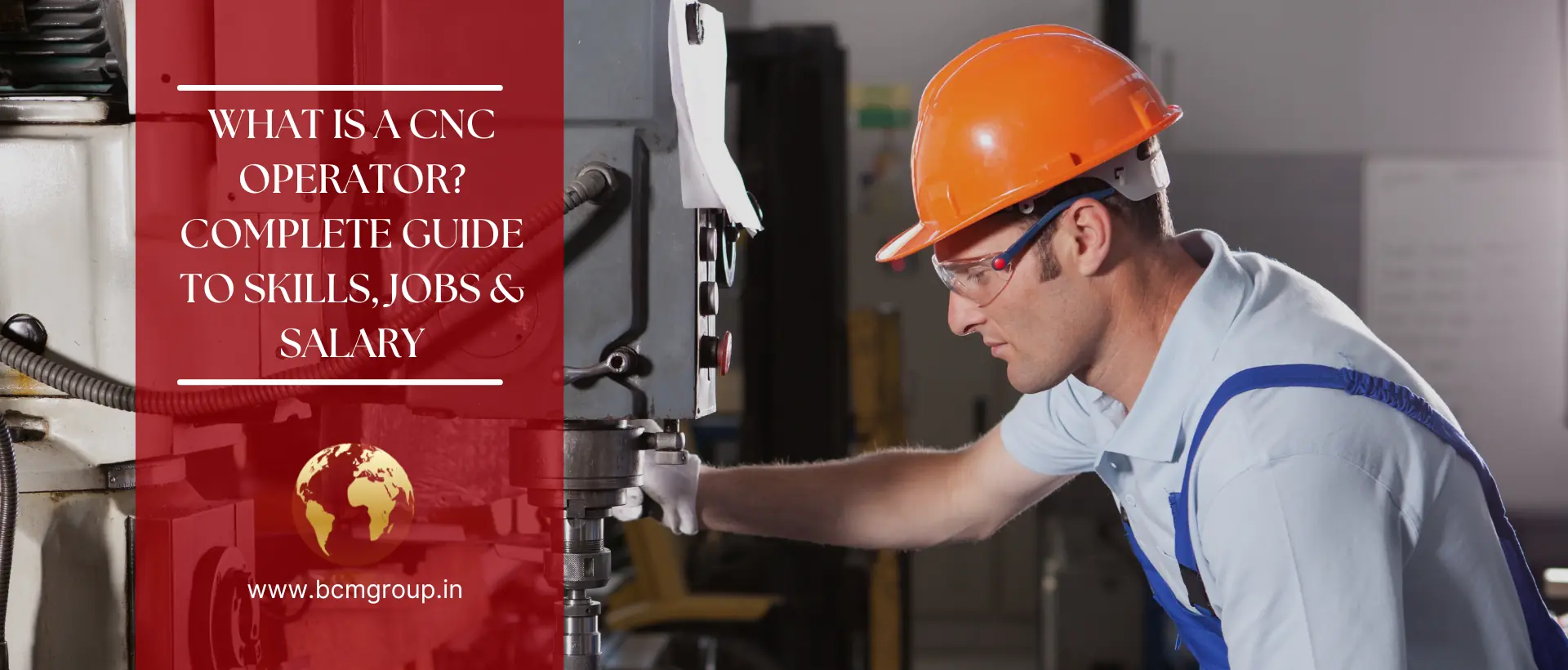
In factories, you’ll often find large machines designed to cut metal and wood with precision and shape them with ease. A person named CNC Operator controls most of these machines. CNC means computer numerical control. This simply means that the machine works with the help of computer instructions.
The CNC operator ensures that the machine sets correctly, runs safely, and produces the right parts. This work is crucial in industries such as cars, furniture and electronics. In this blog, we will explain what a CNC operator does, what skills they need, and why this career remains in demand worldwide.
What is a CNC Operator? A CNC operater is a person who operates a machine controlled by computer programs to produce high-quality parts. The Factory workers use these devices to cut, drill, and shape the materials such as steel, wood and plastic.
The CNC operater makes sure that the machine is correctly executes the program and creates the required parts. This function is important in industries like construction, auto, furniture, and electronics. It ensures that designers create each product in the right size and quality.
The roles and responsibilities of the CNC operator are beyond just starting a machine. These include technical and accuracy-based tasks such as:
These machine operators help to maintain accuracy, reduce waste and ensure smooth production.
Explore the Latest vacancies for CNC Operators with BCM Group, a trusted job consultancy in India.
To grow as a operator, you need more than machine knowledge. These skills will make your work easy and safe.
👉 CNC programming basics: The CNC machine understands G-Code and M-Code to run and adjust programs.
👉 Blueprint & Drawing Reading: Ability to read engineering drawings to know the exact measurements.
👉 Tool handling: various cutting tools, their use, and knowledge to replace them.
👉 Accurate measurement: Using calipers, micrometers, and gauges to check the quality of the product.
👉 Machine setup skills: installation of raw materials, aligning equipment, and preparing the machine before production.
👉 Quality Control: Checking parts for defects and correcting them immediately.
👉 Troubleshooting: Identifying machine errors, tool wear, or program issues and fixing them quickly.
👉 Safety and Maintenance Awareness: Always follow Safety Guidelines to keep machines in good condition.
Continuously learn to stay updated with new CNC technology and improve your skills.
Employers don’t always require a college degree to begin a career as a operator. The key factors are having the right skills and proper training. The basic operator qualifications include:
👉 Many companies are also providing in-house training, so that even freshers can learn and grow with the right skills.
A good operator resume helps employers see your skills and experience quickly. Here’s how to make one that stands out:
✅ Tip: Ensure your resume is straightforward, well-structured, and factually correct. Use bullet points for easy reading. This helps employers to see quickly that you have the right operator skills and experience.
A career as a operator can be gratifying. Salaries vary depending on experience and skills. Here’s an overview:
💡 Tip: Gaining advanced skills, certifications, and hands-on experience with different CNC machines can significantly increase your earnings.
CNC operetors are in demand across various industries. Here’s a quick overview of where they are needed:
Industry | CNC Jobs Available | Average Salary (Entry-Level) |
Automotive | Engine parts, chassis, gears | ₹1.5–₹3 lakh/year |
Aerospace | Aircraft components | ₹2–₹5 lakh/year |
Electronics | Circuit boards, enclosures | ₹1.8–₹4 lakh/year |
Furniture & Woodworking | Cabinets, doors, panels | ₹1.5–₹3 lakh/year |
Metal Fabrication | Tools, machinery parts | ₹2–₹4 lakh/year |
Medical Equipment | Surgical tools, implants | ₹2.5–₹5 lakh/year |
Shipbuilding | Marine engines, hull parts | ₹2–₹4 lakh/year |
💡 Tip: Gaining skills in multiple CNC machines can open opportunities across these sectors.
To become a successful CNC operator, it is more than just running a machine. Understanding how a CNC machine works requires staying precise and improving every day. Here is how you can get there:
🔹 Start with Proper Training: One ITI, diploma or commercial course in mechanical trades. Learning theory and practice together on the shop floor.
🔹 Level up your skills: go beyond videos and train directly on real machines. Spend time in the operation of CNC lathes, milling or drilling machines. The more you exercise, the higher you recognize the device behavior.
🔹 Learn the Language of Machines: Familiarize yourself with G-code, M-code, and CNC packages. Knowing the way to modify programs can store time and reduce mistakes.
🔹 Measure Like a Pro: Accuracy matters. Use calipers, micrometers, and gauges day by day to check your work. Even small errors can affect the final product.
🔹 Follow Safety First: Accidents can crop up in the wink of an eye. Always wear protective equipment, follow safety procedures, and handle the machinery with care.
🔹 Observe and Solve Problems: Every year they release new machines and gear. Be up-to-date with it to be active inside the activity marketplace.
🔹 Keep Learning: Every year they release new machines and tools. Update yourself to become the most valuable in the marketplace.
Working as an operator is rewarding, but real-world issues can make the job tough. Here’s what operators often deal with:
When you begin operating as a CNC operator full form, you step right into a career complete of opportunities in industries like manufacturing, aerospace, and motors. With the proper talents, practical experience, and up to date information of era, you could without difficulty cope with every day demanding situations. By that specialize in accuracy, safety, and continuous studying, your difficult paintings will constantly be valued. Begin enhancing your competencies today and explore job possibilities with relied on partners like BCM Group to take your CNC profession to the next level.
[contact-form-7 id=”d2f63f9″ title=”Candidate Form”]
[contact-form-7 id=”3b2dcad” title=”Employer Form”]
For Companies
SOCIAL LINKS
HEADQUARTERS
409, 4th Floor, Amanora Chambers, Amanora Mall, Near Magarpatta City, Hadapsar, Pune – 411028,
For Job Seekers
SOCIAL LINKS

Registered under Ministry of External Affairs
License No. MUMBAI/PARTNERSHIP/5493853/2021
© 2024–2025 bcmgroup. All Rights Reserved.
This site is protected by reCAPTCHA and the Google Privacy Policy and Terms of Service apply.